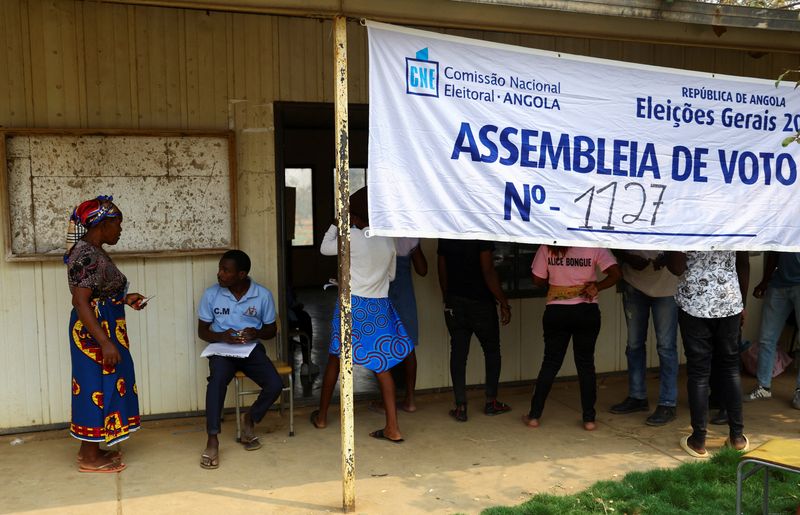Angola awaits election results after opposition casts doubt on ruling party’s early lead
2022.08.25 12:29

A woman arrives at a voting station before casting her vote during the general election in Cacuaco, a suburb of the capital, Luanda, Angola August 24, 2022. REUTERS/Siphiwe Sibeko
By Catarina Demony
LUANDA (Reuters) – Ballot counting was underway in Angola on Thursday in a tense atmosphere after provisional results from a parliamentary election gave the ruling former Marxist party a strong lead and the opposition dismissed them as unreliable.
Election officials said in the early hours of Thursday that preliminary results from Wednesday’s election showed the People’s Movement for the Liberation of Angola (MPLA), in power for nearly five decades, had garnered 60.65% after a third of votes were counted.
The National Union for the Total Independence of Angola’s (UNITA), the opposition party led by Adalberto Costa Junior, gained 33.85%, election officials said, without providing key data such as regional voting distribution or voter turnout.
If confirmed, the MPLA’s majority would easily give President Joao Lourenco a second five-year term.
Political analysts saw Wednesday’s election as UNITA’s best-ever chance of victory amid growing anger among young Angolans at the MPLA for being sidelined in profiting from their country’s oil-fuelled booms. The MPLA has been in power since Angola gained independence from Portugal in 1975.
Thursday’s announcement of provisional results by the National Electoral Commission (CNE) was surprisingly soon after polls closed; in 2017, the elections’ final results were announced two weeks later.
Abel Chivukuvuku, vice-presidential candidate for UNITA, said the early results were not reliable.
“Our polling centres (give) clear provisional indicators of UNITA’s winning trend in all provinces of our country,” he told a news conference.
UNITA and the MPLA have been rivals since before Angola gained independence from Portugal in 1975. The two sides fought a civil war intermittently for over 25 years, in which hundreds of thousands of people were killed.
The last, decade-long bout of fighting was triggered in 1992 when UNITA contested election results giving the MPLA a clear majority. That triggered a re-start of the civil war which lasted until the two sides made a peace agreement in 2002.
Recent ballots, including the last one in 2017, did not spur widespread violence as MPLA’s lead remained solid, but a report by the Institute for Security Studies said that if an MPLA win is perceived as fraudulent, unrest could follow.
“Voters reacted with a lot of incredulity and disbelief,” Angolan political analyst Claudio Silva told Reuters on Thursday, noting that photos of results sheets taken by voters contradicted the provisional count of the CNE.
Several videos emerged during the night of angry voters at polling stations complaining that the result sheet was not shared with the public for consultation, a requirement under Angolan law.
Reuters could not independently verify the footage.
UNITA’s leader Costa Junior had told Reuters on Sunday that contesting the election result was not off the table if the process was deemed undemocratic.








